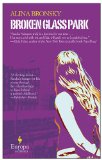Summary | Excerpt | Reading Guide | Reviews | Beyond the Book | Readalikes | Genres & Themes | Author Bio

Sometimes I think I don’t ever want to meet any new people because I’m sick of having to explain everything from scratch. Why my name is Sascha and how long I’ve lived in Germany and how come I speak German so well—ten timesbetter than all the other Russian Germans put together.
I know German because my head is filled with a gray matter shaped like a big walnut. Macroscopically it has lots of ridges and microscopically loads of synapses. I probably have a few million more than Anna—definitely. Besides German, I also know physics, chemistry, English, French, and Latin. If I ever get a B on an assignment, the teacher comes over to me and apologizes.
I’m particularly good at math. When we came to Germany seven years ago, math was the only subject I could handle right away, in the fifth grade. Truth be told, I could have solved the eighth grade assignments. Back in Russia I was in a special math school.
In Germany I couldn’t speak a word at first, but the numbers were the same. I always solved the equations first, and always correctly. I was the only one in class who had any idea what algebra and geometry were. My classmates acted as if they were diseases.
My mother laughed about it and said she found me a little scary. I was always scary in her eyes, though, because I thought much more logically than she did. She wasn’t stupid, but she was too sentimental. She read at least one thick novel per week, played piano and guitar, knew a million songs, and was good at languages. Learned German real fast, for instance— and before that was able to communicate with people in passableEnglish.
Math, physics, chemistry—she was no good at them. Just as she was no good at recognizing when it was time to show a man the door. These are all abilities I must have gotten from my father. All I know about him is that he had multiple doctorates and an unpleasant personality. “You got that, too,” my mother used to say. “And the degrees will no doubt come at some point.”
I’m the only one from our community who goes to the Alfred Delp school. It’s a private Catholic school, and to this day I have no idea why they accepted me back then—pretty much illiterate, never baptized, looking completely out of step in a pink wool sweater my grandmother had knitted. Being led by the hand by a mother only able to speak broken English— very loudly, with a ridiculous accent—and who wore her flaming red hair down. In her other hand was a liter of milk in a plastic bag from a discount grocery store.
Along with my mother, hundreds of German Catholic architects, doctors, and lawyers had applied for spots at the school for their kids. All people who practically had GENEROUS DONOR written across their foreheads in big letters.
You see, at the Alfred Delp school there’s no tuition, but “donations are welcome.” And Mrs. Weimars, the school secretary who peered over the top of her glasses to size up my
mother, me, and the plastic bag, must have quickly come to a
realistic assessment of my mother’s liquidity (as those of us at
such elite schools call it).
Actually, after I started attending the school, my mother did give twenty euros the first year and twenty-two the next - which was all she could afford. She couldn’t really afford those amounts, to be honest, but my mother was a fundamentally giving person. “There’s nothing I hate more than a leech” was one of her favorite sentences. “It’s a quality you hate only in yourself,” I would always answer. “Try hating it in others—like Vadim, for instance.”
In retrospect, I think they accepted me at the school to try to create a little diversity. A lot of doctors, lawyers, and architects got rejection notices for their kids. In the end there were five sections of fifth graders, each one crammed full, and in mine, 5C, I was the only one with an “immigrant background.” In 5A was a kid with an American father, and in 5B another with a French mother. In all my years there I’ve never seen a single black kid or anyone who looked even vaguely Middle Eastern. So in my class I was the heavyweight when it came to diversity.
Excerpted from Broken Glass Park by Alina Bronsky. Copyright © 2010 by Alina Bronsky. Excerpted by permission of Europa Editions. All rights reserved. No part of this excerpt may be reproduced or reprinted without permission in writing from the publisher.
Nearly all men can stand adversity, but if you want to test a man's character, give him power.
Click Here to find out who said this, as well as discovering other famous literary quotes!
Your guide toexceptional books
BookBrowse seeks out and recommends the best in contemporary fiction and nonfiction—books that not only engage and entertain but also deepen our understanding of ourselves and the world around us.